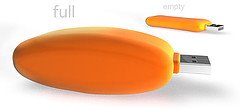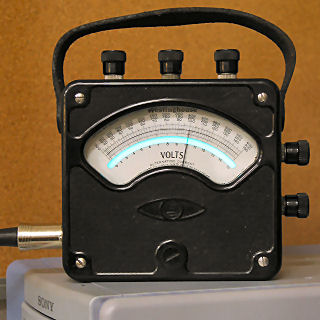Libertarians are nerds.
UPDATE: For comments, see the original blog post here.
Wednesday, April 12, 2006
Is this product usable or not?
 The USB drive in the image to the left literally inflates as it fills up with data. At first glance, this seems like a very intuitive way to give feedback to the user. It fits with our cultural sensitivities (when things get full they get bigger--think water balloons, basketballs, even our own stomachs) and doesn't rely on text or icons. That which is conveyed through the interface is obvious.
The USB drive in the image to the left literally inflates as it fills up with data. At first glance, this seems like a very intuitive way to give feedback to the user. It fits with our cultural sensitivities (when things get full they get bigger--think water balloons, basketballs, even our own stomachs) and doesn't rely on text or icons. That which is conveyed through the interface is obvious.Yet, I can't help but think that while this device might be psychologically usable, it probably isn't very ergonomically useful. That is, it does a good job of cleverly conveying information, but the fact that its size increases might make it uncomfortable to carry. My pockets are already too full with a simple key chain and a regular USB drive (well, I actually have 2 USB drives)--I'm not sure I want to carry something around that, as the day progresses, will get bulkier.
What's more, while I applaud the design for the slickness with which it informs the user through a channel not currently exploited, I don't think the information represented by its changing size is all that useful. Unless I have to pick out a USB drive from a pile of five or six similar devices, I don't really need to know how full the drive is. And, once I plug it into a computer, which I'll inevitably do, I'll know just how full it is then. I guess one situation where the inflated state might come in handy is if I'm in a rush in the morning and know that sometime later that day, I'll need to put stuff on my USB drive. If I pick up the drive and see/feel that it's fairly full, I'll know I have to take a couple of minutes and empty the current contents of the drive on my computer.
But still, after I fill the drive up with data, it's going to be big and bulky.

I think a more effective (although admittedly less playful) design would be to add a decibel-like meter, a la the wrist meter used by Tom Cruise in Mission Impossible, sort of like the image to the right.
Or even cooler, an classic analog needle shrunk down to the size of a USB drive.

I heard about this device here. The images are from here: image 1, image 2, and image 3.
Tuesday, April 11, 2006
This symbol used to represent liberty...
Boing Boing mentions how a protestor in France (presumably protesting the would-have-been repeal of a law that protects workers under 26 from getting fired; here's a good summary) looks like a famous painting by Eugene Delacroix entitled "Liberty Leading the People." Sure, the images look similar, but the spirit of the protest couldn't be more opposite than "liberty leading the people." Protesting to maintain the status quo which has left youth unempolyment in France at over 20% hardly smacks of liberty. Besides, the lady in the painting looks better than the lady in the photograph.
UPDATE: For comments, see the original blog post here.
UPDATE: For comments, see the original blog post here.
Saturday, April 1, 2006
Free-market solutions for parentalism
This passage from a Crispin Sartwell article has been cited by several libertarian heavy hitters (TheAgitator, Hammer of Truth, and Reason to name a few), so since I'm a libertarian heavy hitter (ha!), I'll cite it too.
Clearly, parentalism is not a concept resulting from living in a somewhat free society; it's just basic human nature. Being afraid of new things probably kept our ancestors alive while our would-have-been ancestors perished along with their DNA.
So instead of trying to fight the problem, as Radley implies must be done with his treadmill analogy, why not acknowledge the reality of parentalism and apply some libertarian wisdom to the problem? If people want to have their decisions made for them, why can't private companies do this? They can, and they can [of course] do it better than the government!
In a way, I think this is already occurring, especially through the Internet. A big part of decision making is having information. Google and Wikipedia do this like nobody else. Blogs do it, too. The "main-stream media" does it as well, although with a bit more alarmism than is necessary.
On being controlled, we already get a lot of that from employers (especially if you work for a big company). Dress codes, facial hair codes, speech codes, relationship rules, etc...corporations have it all!
I think there's a market opportunity (which is to say there's currently a defiency) for a business that provides "protection." Not like the mafia or the government, which provide you with coerced protection (we're going to protect you, like it or not!), but a business that provides "peace of mind." That sounds like an insurance company slogan, and I guess insurance companies do this to some degree, but nobody likes insurance companies. There is an opportunity for a business that goes one step beyond advice.
Instead of paying a company for advice (which you're doing indirectly by visiting a website with ads), maybe the next step is to pay a company (voluntarily, remember) to actually make decisions for you. Maybe you'll pay a company to do all your grocery shopping for you but they will decide what's healthy and what's not. Or maybe your favorite internet news site will be customized to report to you the things that make you the most comfortable. Like, if you're paranoid about violent crimes, the site will pepper you with facts about how many people are in prison or how much money is spent on fighting crime. Or maybe it's just the opposite--the site will only inform you of good news and leave you blissfully unaware of the stuff you fear.
I don't know exactly. The market will have to figure this out. But clearly there is a desire for some people to be (or at least feel) more controlled. Let's create free market solutions for this before the government creates its so-called "solutions." As Harry Browne has said, "Whatever the problem in a free market, it will be a profitable opportunity for someone who knows how to fix it." Indeed!
We want the government to guarantee our health, deflect hurricanes, educate our children and license us to drive; we want to be told what to eat, what to smoke and whom to marry. We are justly proud of the fact that no enduring society has ever incarcerated more of its people. Noting that the policeman has a pistol, a club, a stun gun, a can of pepper spray and a database that includes us, we feel happy and secure.Radley Balko (The Agitator) coined this idea of fearing freedom as "parentalism." While frustrating, this realization isn't super surprising. Think of how resistant some people are to move out of their parents' home. Or even how afraid people (myself included) are to try new things. We're fraught with worry when posed with new options...what if I don't like it, what if I can't undo things (like I can on the computer!), what if I lose money?
Our submission is absolute: We want to be operated like puppets and provided for like pets.
The terrorists hate our freedom. But we should be comfortable with that. We hate our freedom, too.
Clearly, parentalism is not a concept resulting from living in a somewhat free society; it's just basic human nature. Being afraid of new things probably kept our ancestors alive while our would-have-been ancestors perished along with their DNA.
So instead of trying to fight the problem, as Radley implies must be done with his treadmill analogy, why not acknowledge the reality of parentalism and apply some libertarian wisdom to the problem? If people want to have their decisions made for them, why can't private companies do this? They can, and they can [of course] do it better than the government!
In a way, I think this is already occurring, especially through the Internet. A big part of decision making is having information. Google and Wikipedia do this like nobody else. Blogs do it, too. The "main-stream media" does it as well, although with a bit more alarmism than is necessary.
On being controlled, we already get a lot of that from employers (especially if you work for a big company). Dress codes, facial hair codes, speech codes, relationship rules, etc...corporations have it all!
I think there's a market opportunity (which is to say there's currently a defiency) for a business that provides "protection." Not like the mafia or the government, which provide you with coerced protection (we're going to protect you, like it or not!), but a business that provides "peace of mind." That sounds like an insurance company slogan, and I guess insurance companies do this to some degree, but nobody likes insurance companies. There is an opportunity for a business that goes one step beyond advice.
Instead of paying a company for advice (which you're doing indirectly by visiting a website with ads), maybe the next step is to pay a company (voluntarily, remember) to actually make decisions for you. Maybe you'll pay a company to do all your grocery shopping for you but they will decide what's healthy and what's not. Or maybe your favorite internet news site will be customized to report to you the things that make you the most comfortable. Like, if you're paranoid about violent crimes, the site will pepper you with facts about how many people are in prison or how much money is spent on fighting crime. Or maybe it's just the opposite--the site will only inform you of good news and leave you blissfully unaware of the stuff you fear.
I don't know exactly. The market will have to figure this out. But clearly there is a desire for some people to be (or at least feel) more controlled. Let's create free market solutions for this before the government creates its so-called "solutions." As Harry Browne has said, "Whatever the problem in a free market, it will be a profitable opportunity for someone who knows how to fix it." Indeed!
Subscribe to:
Comments (Atom)
